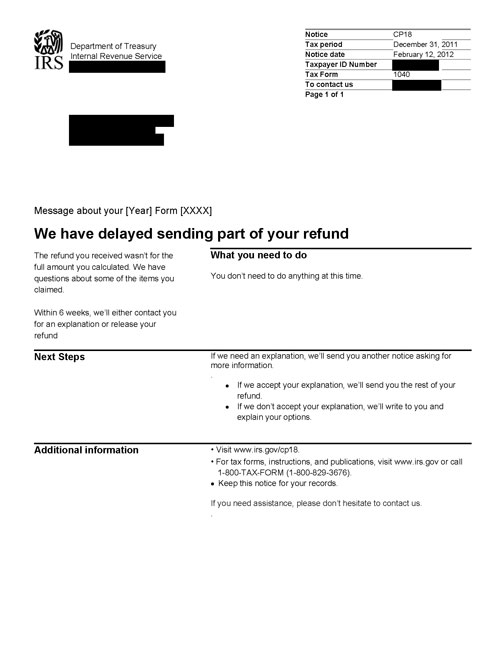IRS Notice CP18
It is critical to know your rights before turning any information over to the IRS. San Diego Tax Attorney William D. Hartsock offers this advice.
Why did I receive a CP18 Notice from the IRS?
If you have received a CP18 Notice from the IRS, it is usually because the IRS believes you claimed one or more deductions and/or credits on your federal income tax return that you shouldn’t have. As a result, the IRS made adjustments to your return that increased the amount of tax you owe and reduced the amount of your refund. Often, the taxpayer will receive a refund check for an amount that is less than expected, and then subsequently receive a CP18 Notice explaining why the refund is not for the full amount requested on the return.
This could affect any Income Tax Audits & Appeals that you are involved in, as well as IRS Tax Litigation or Tax Collections actions.
Whenever you receive a CP18 Notice, you should:
- Read the CP18 Notice carefully, especially the part of the notice where the IRS identifies what deduction(s) and/or credit(s) it believes you claimed improperly, if any specific information is provided in the notice. Then review the relevant portion(s) of your tax return for any obvious signs of a mistake on the return you filed.
- If you paid someone to prepare your return, and the review you do of your tax return reveals that your tax preparer erroneously included a deduction or credit on your tax return, before you contact him or her, keep in mind that in certain circumstances you and your preparer may now have a conflict of interest. Therefore, stop and carefully consider whether you should contact your preparer directly or whether it would be better for someone to contact him or her on your behalf to obtain additional information.
- If you (and/or your spouse) prepared your own tax return and believe you may have made a mistake on it, or if you have any suspicion that your preparer made a mistake on your return, it may be a very wise at this early stage to contact a tax law professional like the ones at www.TaxLawFirm.net to discuss the safest and most prudent way to proceed with obtaining resolution of the issue with the IRS. Although you do not need to be prepared to discuss the following items in any great detail during an initial consultation, you will at some point need to be prepared to discuss the following: (1) the nature of each deduction or credit at issue, and the factual basis for why it was claimed on your return; (2) the amount of each deduction or credit at issue, and the factual basis for why that specific amount was claimed on your return.
- Sometimes the IRS will not provide enough information in the notice for you to be able to figure out what specific deduction or credit the IRS believes you took improperly on your tax return. A Notice CP18 will often advise the taxpayer that an IRS examiner will be contacting him or her if the IRS has additional questions. It may also invite the taxpayer to call the IRS for clarification. Often the manner in which additional information is requested from, or provided to, the IRS will be the difference between a matter being resolved quickly without additional inquiry and an issue blossoming into a full scale audit by the IRS. The experienced professionals at www.TaxLawFirm.net can provide you with invaluable guidance on the best approach to take in your particular situation.
Answers to Frequently Asked Questions:
Why is the IRS reviewing my return?
While most returns are accepted by the IRS as filed, a certain number of returns are selected for examination. The IRS examines some income tax returns to verify that the income, expenses, and credits reported on the return are accurate. The IRS selects tax returns for examination using various methods including random sampling, computerized screening, and comparing information the IRS has received that relates to the return, such as W-2 and 1099 forms. Just because your tax return was selected for examination does necessarily mean that the IRS believes you made an error or were dishonest on your return.
The following images are an example of what an IRS Tax Notice CP18 actually looks like.
This sample notice is for example purposes only. The case facts and figures on your notice will vary according to the specifics of your case.



Comments (0)